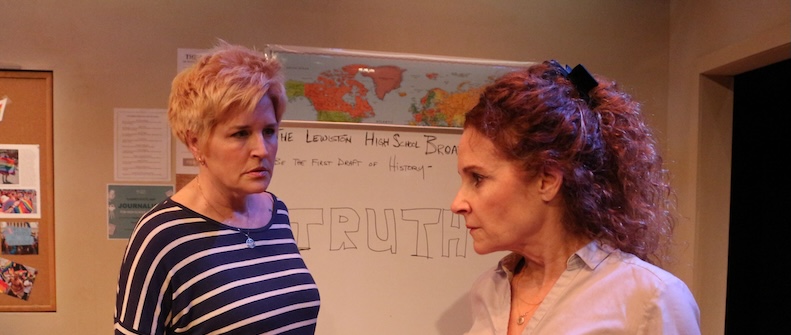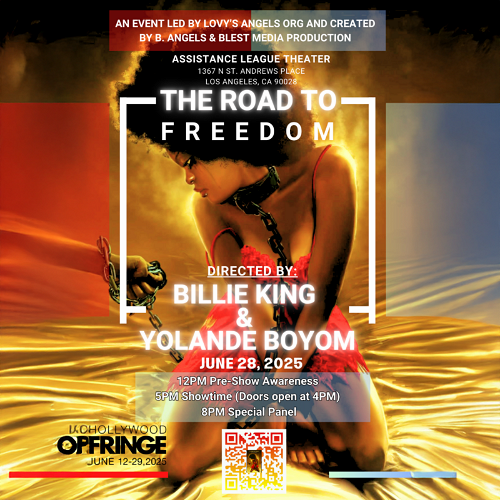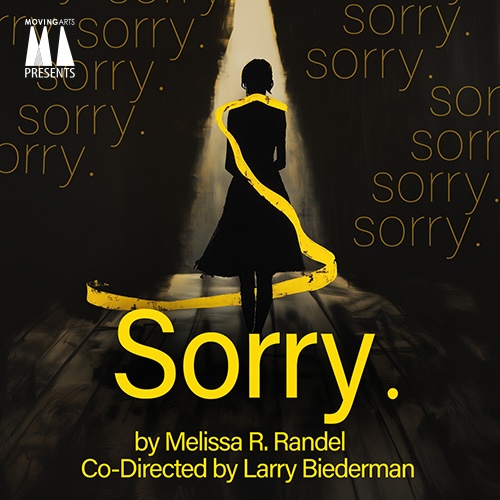

Meeghan Holaway and Christina Carlisi (Photo by Liz Kimball)
Reviewed by Deborah Klugman
The Road on Magnolia
Through May 25
Erik Gernand’s drama, The Totality of All Things commences with its narrative on August 12, 2015. The precise date is cited at the top of the play by its pivotal character, Judith Benson (Christina Carlisi), a teacher of journalism in a high school in a small town, Lewiston, Indiana. Judith is giving an introductory speech to a new group of students, and she’s lecturing them on the importance of truth and the need to commit to its discovery. If you can’t do that wholeheartedly, please leave, she tells them (and someone does).
Judith’s lecture is taking place against the backdrop of a high school football match, a core event in this tiny community that commands the attention and enthusiasm of just about all its citizens because, for one thing, there’s not much else to do. Lewiston is a traditional town in a red state, with pervasively unevolved notions of marriage as the exclusive province of a man and a woman. The Supreme Court’s ruling two months prior — that same-sex couples have a constitutional right to marry — has provoked scorn and confusion among its citizens.
But not Judith. Her best friend, DeeAnn (Meeghan Holaway), refers to Judith as “the lone wolf liberal of Lewiston.” (DeeAnn herself thinks Obama was born in Kenya.) In her classroom (scenic designer Mia Okada’s accurate semblance of an underfunded public classroom) Judith has posted a bulletin board that supports LGBTQ rights and celebrates the Court’s decision.
One morning she enters her classroom to find a large swastika scrawled over her posting. For Judith this is a clear act of hate and its perpetrator must be pursued and revealed. For others — most significantly, the school board whose opinion is voiced by the high school’s principal (and Judith’s former husband) Principal Benson (Carlos Lacamara), the event is best covered up and/or glossed over.
The rest of the drama is the playing out of this conflict over three months’ time, its progression filtered through the perspective of Micah (Victor Kallett), a closeted youngster in Judith’s class who, significantly, is also DeeAnn’s son. And while DeeAnn and Judith have remained fast friends for years despite their varying views, the events this time around may yield another outcome.
For years, authors and pundits have weighed in on the seemingly inexorable split our nation sustains between those on the left who honor DEI, the right to choose and other progressive causes (these citizens tend to gravitate to cities), and those who hold contrarian views, often colored (though not always) by the hidebound teachings of their traditionalist church. Many argue that the lack of a solution to this schism lies on the Left, with too many progressives demonizing the other side. If only they knew how to reach out, it is said, our country would heal and we could move on.
In The Totality of All Things, Gernand aims to encapsulate this national dichotomy, represented on the one hand by Judith, who battles for truth and justice as she sees it, and DeeAnn and Gregg — another high school teacher and also a part-time minister — on the other. For DeeAnn and Gregg, portrayed as honest, unmalicious people, the notion of gay marriage and gayness in general are alien concepts. In fact, for DeeAnn, the entire issue is moot — there are no gay people in Lewiston, she declares with unbridled surety.
But — what promises to develop into a compelling drama that speaks to the myopia that afflicts so many of us on either side soon segues, under Taylor Nichols’s direction, into a sapless rendering of conflicting perspectives. Some of the staging doesn’t serve the play — there are moments that should reflect familiarity or intimacy where actors merely face each other or stand purposelessly at a distance.
Some performances are better realized than others, although, as of opening night, each had a way to go. Holaway works hard at defining the personally generous Midwestern housewife who is likely MAGA, and Gloria Ines devotes equal energy to her role as Judith’s assistant teacher (the role is challenging because her character seems mostly there to observe, then tellingly react to the explosive outcome). Kallett (making his first professional stage appearance) is most convincing as a youth who transforms from a timid naif to a young man with an ethical and moral point of view, capable of making his own choices. But even here the performance is more a successful draft than the fully developed persona needed for the play to fully impact. On opening night, I found this also true of Carlisi’s pivotal performance, and others.
One more aspect of the play bears mention: the tendency of the playwright to stack the deck against Judith, who appears increasingly dense as the drama intensifies, even as everyone else behaves more reasonably. While some of what amounts to cruel obstinacy might have been tempered in performance, it’s nonetheless an element in the storytelling that’s embedded into the character — and one that is easily modified by altering a detail in Judith’s history. As is, the play’s denouement provokes the same kind of frustration one encounters when reading yet another disquisition in the mainstream press about the need for progressives to probe the reasons, and make allowances, for the bigots on the other side. And it’s getting worse. The play’s scenario transpires in 2015; ten years later, take note of the latest foreboding remarks from one time leftist satirist and commentator Bill Maher, whose apologies for the Giant Orange One following a dinner at the White House have segued to an embrace.
The Road Theatre Company, The Road on Magnolia, 10747 Magnolia Blvd., N. Hollywood. Fri.-Sat., 8 pm, Sun., 2 pm; thru May 25. https://roadtheatre.org Running time: approximately 95 minutes with no intermission.




















